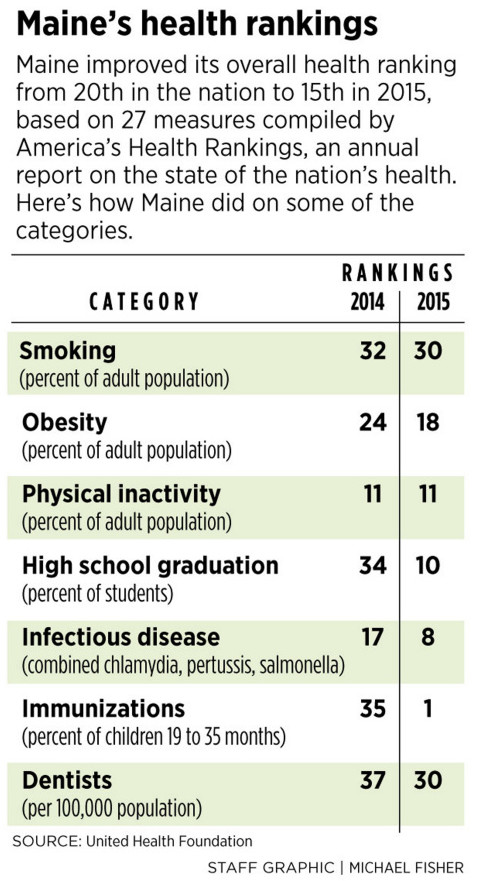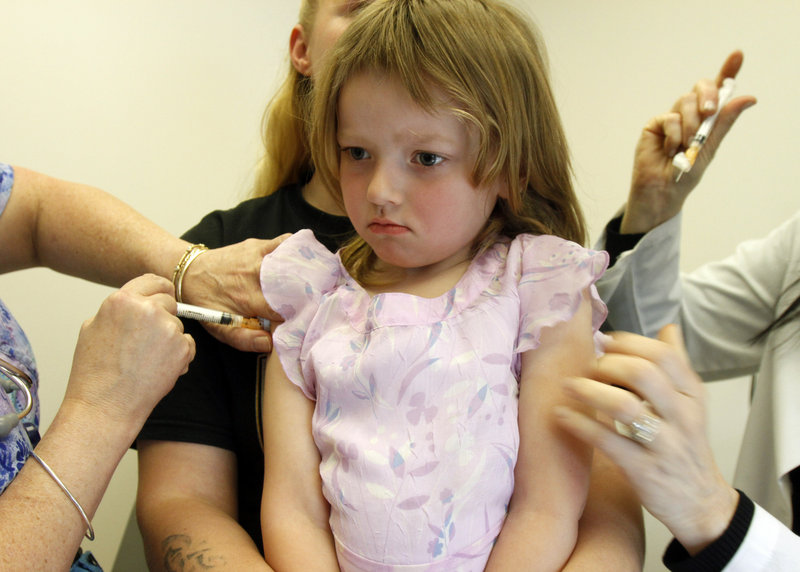Maine’s overall health ranking improved in 2015 and public health experts are crediting much-improved immunization rates for toddlers as a major reason why.
Maine’s health ranking jumped from 20th in the nation last year to 15th in 2015, according to the America’s Health Rankings report released Thursday. Conducted by the Minnesota-based United Health Foundation, the report measures each state’s health by examining 27 factors, such as smoking rates, obesity, immunizations, infectious diseases, dentists per capita, infant mortality, crime and drug overdose deaths.
Hawaii had the highest ranking and Louisiana the lowest. All of the New England states ranked ahead of Maine, with Vermont checking in behind Hawaii at No. 2. Maine typically ranks between 10th and 20th, and is often the lowest-ranked state in New England. Last year’s score was the worst Maine had ever received.
While Maine’s health in many of the categories was similar to last year, the immunization rate for children ages 19-35 months shot from 35th in the country to first in 2014. Maine, however, still has among the worst rates of vaccine refusal in the nation among parents of children entering kindergarten, according to the U.S. Centers for Disease Control and Prevention. Maine had the eighth-highest non-medical opt-out rate in the nation for the 2014-15 school year, a slight improvement from the fifth-highest opt-out rate the previous year.
But for parents of toddlers, the news is much better.
Based on a survey of health care providers, vaccine coverage for the toddlers increased from 68 percent to 84.7 percent, best in the nation. The vaccine rates were based on a 2014 survey – the latest available – and first made public this past summer.
“To have that much of an increase in one year is almost unheard of,” said Dr. Amy Belisle, the director of child health quality improvement with Maine Quality Counts, a public health advocacy group that worked to improve immunization rates. “It’s really quite amazing.”
Maine Quality Counts, collaborating with the Maine CDC, has worked to improve vaccination rates by providing public education for physicians’ practices, working especially closely with 24 practices. Among the initiatives was creating a system that reminded parents it was time to bring in their children for their vaccines.
Belisle said much of the groundwork on the program occurred in 2011 and 2012, but it took a while for the message to spread from the 24 practices to other doctors and become more standard in Maine.
“We did a lot of education for providers on vaccines, and now we are starting to see the results of all that work,” Belisle said.
Also, vaccines are now free to all people age 19 and under in Maine, thanks to a state law, removing any financial barriers to getting shots.
“We’re now reaching the vast majority of kids and families that want the vaccines,” Belisle said.
The good news on toddler vaccines contrasts with Maine’s voluntary vaccine opt-out rate for children entering kindergarten, which continues to be among the highest in the nation at 3.9 percent. Parents are permitted to opt out of vaccines required for entrance to school by signing a philosophic or religious exemption. Parents refusing or delaying vaccines for their children often express fears that the vaccines will be harmful, despite scientific research that proves vaccines are overwhelmingly safe. A 1998 study that claimed there was a link between vaccines and autism has since been debunked and retracted.
Belisle said perhaps the message is getting through on the benefits of vaccines to the parents of younger children, and overall there’s more awareness of the dangers of infectious diseases by parents because of the media coverage surrounding this year’s Disneyland measles outbreak. National surveys since the measles outbreak showed that parents were more likely to believe vaccines were important and effective compared to before the Disneyland
Belisle said the Press Herald’s extensive coverage of vaccines also helped raise public awareness of vaccines. The newspaper obtained a school-by-school database from the Maine CDC and published it on its website, which for the first time gave parents a searchable tool to look up their school’s vaccination rates. Belisle hopes that by the time parents of younger children start sending their children to kindergarten, maybe the state’s school vaccination rate will improve.
A bill that would have made it more difficult for parents to opt out of vaccines for non-medical reasons narrowly failed in this year’s Legislative session. Although it received strong support, lawmakers did not have enough votes to override a veto by Gov. Paul LePage.
Meanwhile, how Maine measures up to the rest of the nation in other aspects is a mixed bag. While the state has poor rankings for the number of smokers and children in poverty, coming in at 30th in both categories, it’s 11th in being physically active, 18th in obesity and 10th in the nation for high school graduation.
Deborah Deatrick, senior vice president of community health for MaineHealth, said that while smoking rates overall are poor, the highest rates are among men who did not finish high school. Deatrick has worked with the Fund for a Healthy Maine on reducing smoking in Maine, and she said the teen rate has decreased substantially over the past decade. Maine’s high graduation rate coupled with fewer teenagers taking up the habit likely bodes well for the smoking rankings to improve in upcoming years, she said.
Deatrick was pleased to see Mainers are active and are not as likely to be obese.
“The obesity rate appears to be flattening, and Maine is a great state to be active, with a lot of outdoor activities,” Deatrick said.
Send questions/comments to the editors.





Success. Please wait for the page to reload. If the page does not reload within 5 seconds, please refresh the page.
Enter your email and password to access comments.
Hi, to comment on stories you must . This profile is in addition to your subscription and website login.
Already have a commenting profile? .
Invalid username/password.
Please check your email to confirm and complete your registration.
Only subscribers are eligible to post comments. Please subscribe or login first for digital access. Here’s why.
Use the form below to reset your password. When you've submitted your account email, we will send an email with a reset code.